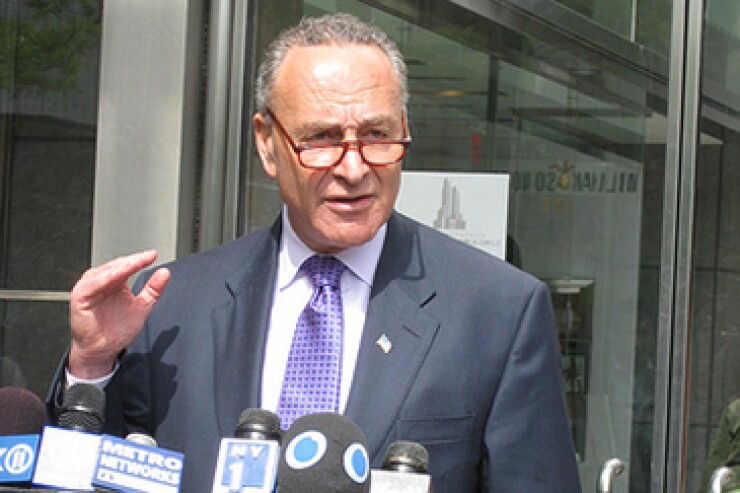
Federal funding can meet vast infrastructure needs more effectively then the tax breaks for private investments the Trump administration touts, U.S. Sen. Charles Schumer said Thursday night in New York.
"On infrastructure, we need a bill that includes direct investments that will put millions of people – not just those with Ph.D.s in astrophysics -- to work with good paying jobs to do something we very much need," Senate Minority Leader Schumer, D-N.Y., said during the Citizens Budget Commission's 85th annual awards dinner at the Pierre Hotel.
"Not a program of tax credits where 85 cents on the dollar goes to repave and build roads only in places that are relatively affluent that can repay the bonds – they won't be built elsewhere," he told about 700 people.
CBC, a nonpartisan watchdog organization founded in 1932, presented Schumer with its medal for high civic service.
Tax credits, said Schumer, would not help finish the proposed Gateway tunnel project under the Hudson River. "You can repeat that over and over and over again throughout the country."
President Trump has called for $1 trillion in infrastructure investment over 10 years, though Republicans and Democrats differ how to finance projects.
While Trump, a Republican, has called for incentives for private investments and an expansion of public-private partnerships, Democrats have proposed $1 trillion in direct federal funding for a variety of infrastructure projects and an expansion of the Transportation Investment Generating Economic Recovery, or Tiger, grant program by $10 billion.
"We're not going to do infrastructure with these tax credits," said Schumer. "There are times when we'll have to fight Donald Trump, and I'm ready for it. I'm from Brooklyn."
The American Society of Civil Engineers on Thursday called for doubling the 10-year plan to $2 trillion, saying the nation's infrastructure would continue to deteriorate. The society issued a D-plus grade to the U.S. in its updated assessment, matching its 2013 grade.
Bank of America Merrill Lynch expects some federal action on infrastructure, though states will on their own for projects such as road resurfacing.
"There is still little clarity on federal initiatives on tax, infrastructure and numerous other proposals," it commented. "The states would be well served to aggressively pursue their own infrastructure goals, in our opinion."
CBC also issued its inaugural Felix G. Rohatyn Award, recognizing legendary champions of New York and its sound fiscal management, to Rohatyn himself.
Rohatyn, 88, the former Lazard banker and later a U.S. ambassador to France, helped save New York City from bankruptcy in the 1970s. From 1975 to 1993, he chaired the Municipal Assistance Corp., a state-run oversight agency that guided the city out of its fiscal crisis.
Eugene Keilin, who formerly chaired the MAC and CBC in separate tenures, presented the award to Rohatyn's son, Nicolas.
"In 1975, New York City was a one-car crash, largely of its own making," said Keilin. "There was no playbook, no emergency manual, no safety net. Fortunately, a small group of New Yorkers grabbed the wheel and pulled the car away from the cliff.
"They will tell you that Felix Rohatyn was the man who brought them all together."
CBC awarded its public service innovation prize to the New York City Housing Authority for its digital initiatives.
As part of its NextGeneration NYCHA 10-year strategic plan, the nation's largest public housing authority has undertaken several measures to enhance efficiency, reduce operating costs and improve customer service. They include a mobile device for field staff and online annual recertification.
According to CBC, savings have already exceeded $3 million annually, with "significant potential" for further savings.





